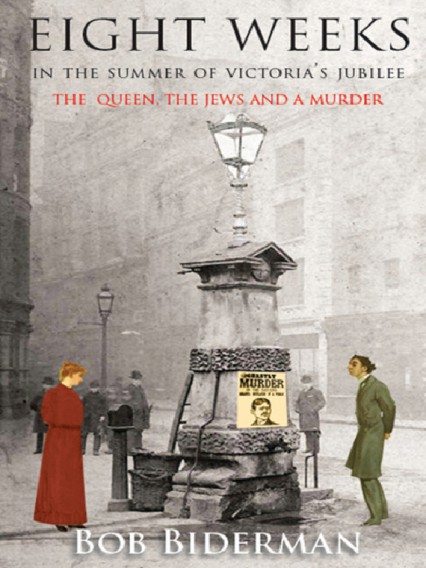Amidst all the excitement about Queen Elizabeth’s Jubilee this year, a previous Jubilee has been forgotten. Mostly, that is. Novelist and historian Bob Biderman focuses on Queen Victoria’s Jubilee year, 1887, in his new novel, Eight Weeks in the Summer of Victoria’s Jubilee: The Queen, the Jews and a Murder.
Nominally a mystery, Eight Weeks is really an interesting social commentary, exploring the plight of immigrant Jews in London’s East End in the nineteenth century. Although the novel does involve the two main characters, Z and Maggie, attempting to get Israel Lipski, who has been accused of murder and is awaiting capital punishment, exonerated and freed, and the reader is left unsure until the very end about what exactly happened on the morning a poor, pregnant Jewish woman was murdered, the story is larger than that.
Eight Weeks is about an actual murder case and Maggie and Z are based on real people, Margaret Harkness and Israel Zangwill, who were both writers. But what Biderman has done with the basic facts, which he clearly researched in detail, is to open them out so that larger issues are discussed. He connects this particular case and these specific people to the historical and cultural contexts, commenting on society’s behaviour towards and treatment of immigrant Jews, as well as dropping in characters such as Erik Satie or Frank Baum or Virginia Woolf, which helps set the scene.

by Bob Biderman
318 pp., Cambridge: Black Apollo, £13.95
Since Z and Maggie are both writers and the plot involves them working on various journalistic and other pieces, in some ways Eight Weeks is also about writing, about what it is possible to write and how, and about what it means to have the power to write and shape opinion.
But more than all that, the novel also speaks to issues of finding or creating a self and finding an identity; in particular, the character of Z considers what it means to be Jewish, even if not religious, in a non-Jewish and sometimes even anti-Semitic world. Z ponders the idea of the Wandering Jew and reflects on a talk given by the historian Heinrich Graetz: ‘if he [the Wandering Jew] existed and would bear witness to the crucifixion, Christian faith could be saved. In the German form he was a degraded outcast, but in the form in which it reached France the figure of the Wandering Jew was ennobled and began to symbolise the idea of wandering Judaism that stands on a lofty turret, and from this position surveys the rising and falling billows of the world’s history. It speaks all tongues for it has been in all lands. It escapes, in a manner which must be regarded as a miracle, all dangers and terrors. It is the youngest brother of time. It has a mighty memory of all the events of the thousands of years which have passed before it. The historical memorials of Judaism are, therefore, the most extensive of all nations and its history forms a history of the world in miniature.’ However, as Z realises, the rest of the world may not recognise or appreciate this fact, which helps explain why the Jews are so disliked in the East End.
For Maggie, the main concern is about finding her way as a woman in a society that is not prepared for strong, independent females (despite the obvious example of Queen Victoria). Maggie is not as strong or well-developed as a character as Z is, however, so it feels as though this subject is not explored quite as much as some of the other ones.
Eight Weeks is not as fast-paced as the typical thriller, but then it is likely not meant to be, either. Instead, it is a novel with a mystery at its core but since the murder was in many ways caused by the time and place, Biderman slows down the proceedings in order to analyse the bigger picture. In this year of the Jubilee, it is worth looking back to an earlier one and considering what life was like in England then.











